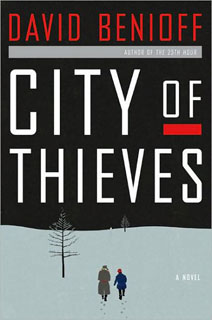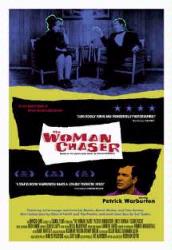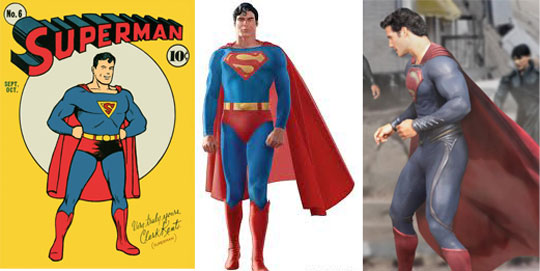 “The City of Thieves” (2008) is set amidst the siege of Leningrad during World War 2. Lev Beniov, age 17, is caught looting–in this case, the body of a dead German pilot who parachutes into his neighborhood. He is thrown into a prison, where he meets Kolya, a colorful, charismatic infantryman accused of desertion.
“The City of Thieves” (2008) is set amidst the siege of Leningrad during World War 2. Lev Beniov, age 17, is caught looting–in this case, the body of a dead German pilot who parachutes into his neighborhood. He is thrown into a prison, where he meets Kolya, a colorful, charismatic infantryman accused of desertion.
Both expect to be executed the next morning. But instead, a KGB (or something like that) colonel offer them a deal. His daughter is getting married, and they need a dozen eggs to make the wedding cake. In a city where people starve to death every day, food is at a premium, and eggs are nonexistent. But if they can find a dozen eggs in a week’s time, he’ll let them live.
And so, Lev and Kolya descend into the city to find eggs, or clues about where they could find eggs. Their journey exposes readers to the nightmarish conditions of Leningrad, and to people willing to do anything–anything–for a scrap of food.
The siege of Leningrad began in September 1941, when the Germans totally cut off all access to the city by land. The siege didn’t end until the end of January 1944, almost 2.5 years. During that time, 1.5 million people died, making it the most lethal siege in history. Another 1.4 million were evacuated, and many of them died. Cannibalism was common.
The opening chapter, after a prologue, begins:
“You have never been so hungry; you have never been so cold. When we slept, if we slept, we dreamed of the feasts we had carelessly eaten seven months earlier–all that buttered bread, the potato dumplings, the sausages–eaten with disregard, swallowing without tasting, leaving great crumbs on our plates, scraps of fat. In June of 1941, before the Germans came, we thought we were poor. But June seemed like paradise by winter.”
“The City of Thieves” illuminates this horrific situation. And yet, it’s not a dark book. The light-hearted character of Kolya off-sets some of that, as does the ludicrousness of their quest–eggs for a wedding cake.
They search within the city for a while, and then go outside the city, to villages behind German lines. Here they encounter prostitutes selling their bodies to Germans to remain alive, and they have run-ins with Germans and with Russian partisans. One partisan is Vika, a young girl who happens to be a crack sniper and all-around warrior–and who’s mission in life is to kill a sadistic German commander.
I can’t tell you anything more beyond this point without spoiling the story for you. Suffice it to say, this book is well worth your time.
The book is actually a framed story. It begins in modern day America, with the author sitting down with his immigrant grandfather and asking him to tell about his experiences in Russia during the war. His grandfather is Lev. We don’t return to modern times until the final four-page chapter. But let me tell you–it’s a wonderful ending. Sort of what I expected, and yet, so satisfying on every level.
I truly loved this book, and my interest never lagged. There are a number of little threads which keep you wondering–like, what’s with this book Kolya keeps talking about? But all are resolved in good time, and satisfactorily. The writing is superb, the characters are interesting and well-drawn, and the story moves right along. And in the process, you learn some good history.
Read “The City of Thieves.” You’ll enjoy it.
2 Comments

 “The Woman Chaser” (1960) is not a good title for this book. The book is not about chasing women, though Richard Hudson does some of that. But he’s really chasing success, or self-actualization.
“The Woman Chaser” (1960) is not a good title for this book. The book is not about chasing women, though Richard Hudson does some of that. But he’s really chasing success, or self-actualization.



